Treatment with the help of the patient’s own information
in the BICOM® mobile VET bioresonance device
In contrast to other “frequency therapy devices”, BICOM® bioresonance is a method that is highly individual and perfectly tailored to the needs of the patient through the use of the patient’s own information and the possibility of testing specific wave patterns for resonance.
The patient’s own pathological and physiological information is recorded using special applicators and fed into the BICOM® mobile VET.
Depending on the therapy program, the specific wave pattern as a carrier of information is amplified, weakened or inverted and transmitted back to the patient in modulated form, which means that the transmission of information changes in clarity depending on the modulation or it disappears completely.
The treatment signals continuously adapt to the changing pathological situation of the patient. As the therapy progresses, the body’s ability to regulate is reactivated.
Find out more about this topic at our regular events. Together with veterinarians and animal naturopaths, we offer various face-to-face and online events .
The BICOM® bioresonance method is a cause-oriented, holistic treatment concept. It can narrow down the cause of the health problem in animals and find out even the hidden causes of the clinical picture.
Animals have a natural regulatory system that can also compensate for unusual influences. However, even good self-healing powers eventually reach their limits. Persistent exposure to allergens, environmental toxins, fungi, viruses, bacteria or stress and changed living conditions weaken the immune system and are often the cause of an illness. In particular, fungal infestation on the skin or chronic diseases in general are not always due to a breeding-related genetic defect, but are signs of a disturbed immune system.
The BICOM® bioresonance method is the key to successful diagnosis and therapy, especially for animals that cannot tell us exactly where it hurts or what the symptoms are. It is a gentle form of therapy that can be carried out without side effects and without additional stress for the animal.
The BICOM® mobile VET records the bioenergetic state of the animal, processes the information it contains and returns modified vibrations / therapy frequency patterns to the animal. Symptoms and stress can be diagnosed and targeted therapy can be initiated.
Through the use of endogenous and exogenous substances, the body’s own self-healing powers can be activated and imbalances that have existed for a long time can also be regulated.
REGUMED Medizintechnik are pioneers of the BICOM® bioresonance method. More than 30,000 therapists worldwide, well over 10,000 of them in Germany, successfully use their therapy concept.
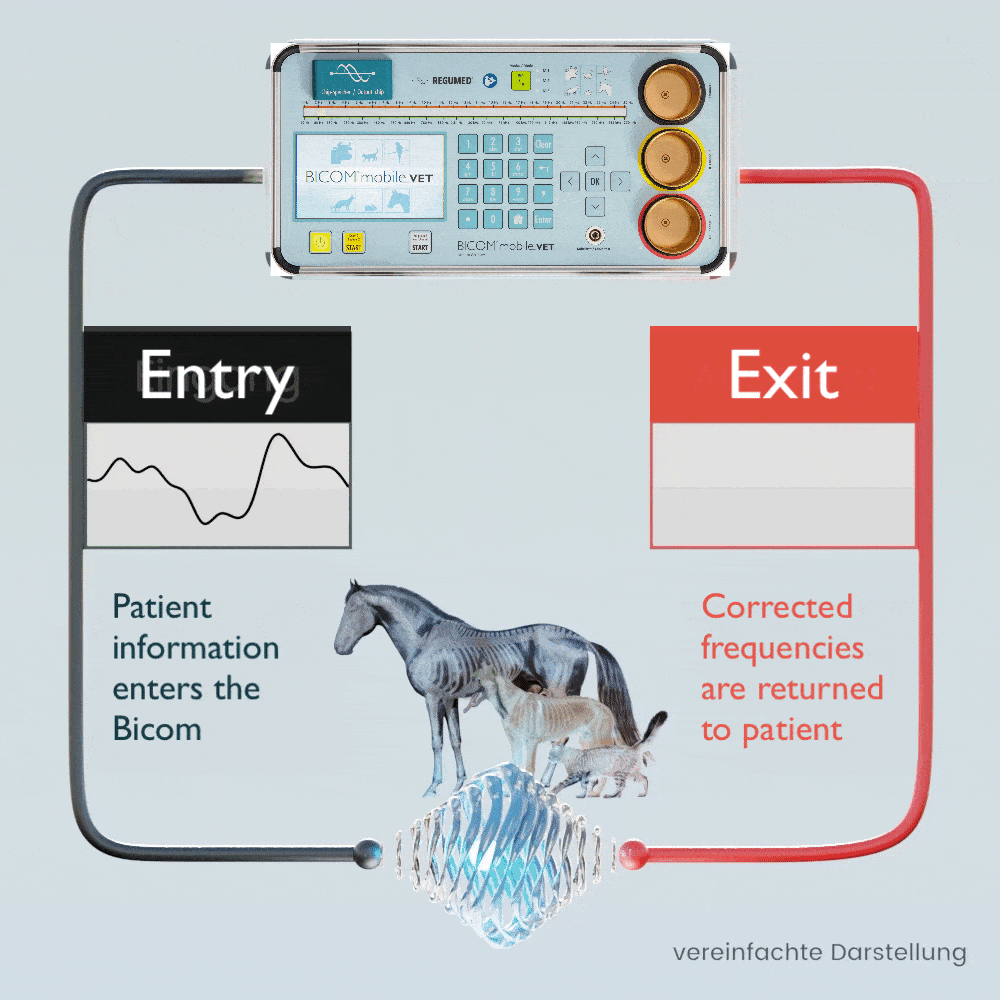
Biophysical basics of the bioresonance method
Life is only possible when three conditions are met: matter, energy and information.
We also find these aspects in conventional medicine, both in diagnostics and in therapy. For example, every drug is also a carrier of information.
Information is neither energy nor matter, it is immaterial and comparable to the meaning of a message from a sending to a receiving system.
In addition to the electrical processes in the receptor proteins and biomembranes in general, electromagnetic interactions through light (biophotons) also play a role in cell communication and the transmission of information.
Specific electromagnetic wave patterns act as information carriers. These wave patterns can be modulated by the BICOM® device in order to eliminate disturbing or stressful information in an organism.
The goal is to restore the free flow of healing information (cell communication) and thus support the self-regulation of the organism and the self-healing powers.
Individual, patient-specific information or information from native substances, digitized substances or information stored on storage media can be used for therapy.
What your colleagues are saying…
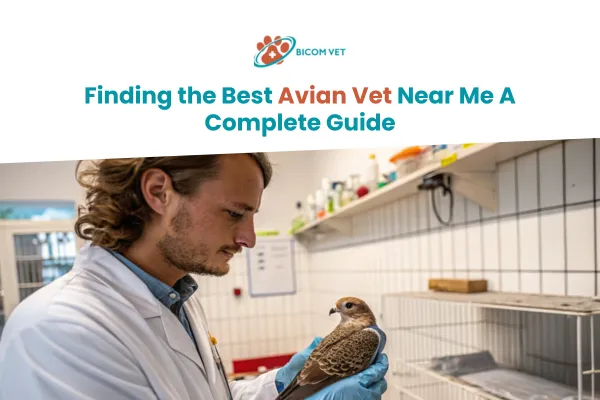
Top Avian Vet Near Me: Essential Guide for Pet Bird Care
Finding the Best Avian Vet Near Me: A Complete Guide
When it comes to your feathered friend’s health, finding the right avian vet near me is crucial. Birds, unlike other common pets, have unique medical needs that require specialized care. Whether it's a routine check-up, treatment for a condition, or emergency care, choosing the right vet ensures your bird gets the best possible care. In this guide, we’ll walk you through everything you need to know about finding a quality avian vet in your area.
Why Choosing an Avian Vet Matters
Choosing an avian vet who specializes in bird health is essential for maintaining the well-being of your pet. Avian vets undergo specialized training that equips them with the knowledge to treat diseases specific to birds, including respiratory issues, feather problems, and digestive disorders. Unlike general veterinarians, avian specialists understand the unique anatomy and needs of birds, which can make a significant difference in treatment outcomes.
Birds have fragile respiratory systems, unique metabolic processes, and an instinctual habit of hiding signs of illness. A skilled avian vet knows how to diagnose these subtle signs and provide targeted treatment. Avian vets also have access to the latest diagnostic tools specifically designed for birds, ensuring that your pet receives the most accurate care possible.
Moreover, birds often have a very different approach to illness compared to other pets. While dogs and cats may vocalize their discomfort, birds tend to remain quiet, making it harder for their owners to notice health issues until they become serious. An avian vet is trained to detect problems early and can offer preventive care to maintain optimal health.
Signs You Need an Avian Vet
Not all vets are equipped to handle the delicate nature of bird health. Birds communicate differently from other pets and can hide their illnesses, making it even more important to watch for early signs of health problems. Here are some signs your bird might need an avian vet:
Loss of appetite: If your bird refuses to eat or drink for more than 24 hours, it’s time to consult a vet.
Lethargy or unusual behavior: Birds are generally active and alert, so any noticeable lethargy or odd behavior should be addressed.
Labored breathing: If your bird is wheezing or has difficulty breathing, it could be a sign of a respiratory issue.
Changes in droppings: Abnormal droppings can be a signal of dietary issues or internal health concerns.
Feather plucking or abnormal molt: Feather loss or over-grooming can indicate stress, illness, or nutritional deficiencies.
If your bird shows any of these signs, it’s best to seek out a professional who specializes in avian care to ensure proper diagnosis and treatment.
Key Services Offered by Avian Vets
A good avian vet should offer a range of services tailored to bird health. These services go beyond basic check-ups and can include the following:
Routine Check-ups: Regular health exams are essential for preventing illnesses and ensuring that your bird is thriving. Routine visits help catch health problems before they become serious.
Emergency Care: Birds can sometimes have sudden medical emergencies, such as choking or injury. A skilled avian vet can provide immediate care during critical situations.
Nutritional Guidance: An avian vet will recommend the right food and supplements for your bird’s specific species and health needs, ensuring they receive a balanced diet.
Surgical Services: If your bird requires surgery—whether for a broken bone, tumor removal, or beak/nail trimming—an avian vet is equipped to handle it safely.
Diagnostics: Blood work, x-rays, and other advanced testing methods can help diagnose infections, organ issues, or other underlying health problems.
Behavioral Consultations: Sometimes, birds develop behavioral problems like aggression or excessive noise. An avian vet can offer advice on addressing these issues, often recommending changes in diet, environment, or training.
How to Find the Best Avian Vet Near Me
Finding a reliable avian vet involves a few key steps:
1. Online Research: Start by searching online for avian vets near you. Websites like Google, Yelp, or specialized pet directories can provide useful information, including ratings, reviews, and practice details.
2. Referrals: Ask other bird owners, breeders, or local pet stores for recommendations. Those with experience in avian care can provide valuable insights and direct you to trusted professionals.
3. Accreditation: It’s important to choose a vet who is specifically trained in avian medicine. Look for vets certified by organizations like the American Board of Veterinary Practitioners (ABVP), which offers board certification in avian medicine
4. Visit the Clinic: Once you have a list of potential vets, consider visiting the clinics in person. Pay attention to factors like cleanliness, the professionalism of staff, and the overall atmosphere.
5. Ask Questions: When you visit the vet, ask about their experience, approach to bird care, and availability for emergencies. It’s also important to find out if they have the necessary equipment for diagnostics and treatment.
Common Bird Health Issues Treated by Avian Vets
Birds can suffer from various health conditions, some of which require immediate medical attention. Some common health issues that avian vets treat include:
Psittacosis: Also known as parrot fever, this bacterial infection can be transmitted from birds to humans. It can cause symptoms like coughing, fever, and fatigue in humans.
Egg Binding: This is a serious condition where a female bird is unable to lay an egg. This can lead to significant distress, and the bird may need medical assistance to pass the egg.
Feather Plucking: Birds sometimes pluck their feathers, which can be a sign of stress, boredom, or a medical condition.
Parasites: Birds can host internal and external parasites like mites, worms, and lice. These parasites can cause discomfort and, in some cases, severe health issues.
Respiratory Issues: Birds are prone to respiratory infections, which can lead to symptoms such as labored breathing, wheezing, or nasal discharge. A vet can help diagnose and treat these issues.
Each of these conditions requires specialized care, and an experienced avian vet will know how to treat them effectively.
Cost of Avian Vet Care
The cost of avian vet care can vary depending on factors like location, the complexity of the treatment, and the type of service you require. Routine check-ups might cost between $50 and $150, while more specialized services like surgeries or emergency visits could cost several hundred dollars. For instance, a blood test could cost around $100 to $300, while emergency care or surgery may be significantly more expensive.
It’s also important to consider that some avian vets may offer packages for routine care, which could help save costs over time. Be sure to inquire about pricing upfront, and check if your vet accepts pet insurance, which can help offset some of these costs.
What to Expect During Your Visit
When you visit an avian vet, the first thing you’ll likely experience is a comprehensive health exam. The vet will assess your bird’s overall physical condition, including checking its feathers, beak, eyes, and skin. They might also ask about your bird's behavior, diet, and living environment.
Depending on the symptoms or condition, the vet may conduct additional tests, such as blood work or x-rays, to help determine a diagnosis. This is especially common if your bird is showing signs of illness or distress. After the examination, the vet will provide treatment recommendations, which might include medications, changes in diet, or follow-up visits for further monitoring.
How Often Should You Visit an Avian Vet?
Generally, a healthy bird should visit the vet once a year for a routine check-up. However, if you notice any changes in your bird’s behavior, appetite, or appearance, you should seek immediate care. Birds can often hide symptoms of illness, so regular check-ups can help catch issues early. Additionally, if your bird has specific health concerns or is aging, more frequent visits might be necessary.
FAQs
1. How do I know if my bird is sick?
If your bird shows signs like loss of appetite, lethargy, or labored breathing, it’s best to consult a vet. Early detection is key to effective treatment.
2. What should I expect during my bird’s check-up?
During a check-up, the vet will examine your bird’s feathers, beak, eyes, and overall health. They may also perform diagnostic tests if necessary.
3. How often should I take my bird to the vet?
It’s recommended to take your bird for a check-up once a year. However, if your bird shows any signs of illness, visit the vet sooner.
4. Can general vets treat my bird’s health issues?
While some general vets may offer basic care, it’s better to see a specialist trained in bird health for accurate diagnosis and treatment.
5. What are the common signs that my bird needs medical attention?
Signs include loss of appetite, difficulty breathing, unusual behavior, and feather plucking. Consult a specialist if any of these occur.
Conclusion
Finding the right avian vet near me can make a world of difference in the health and happiness of your pet bird. A specialized vet is trained to handle the unique needs of birds, from preventative care to emergency treatment. By doing your research, visiting local clinics, and asking the right questions, you can ensure that your bird receives the best care available.
Birds are amazing companions that deserve the best care, and choosing a knowledgeable and experienced avian vet is a vital step in ensuring their long-term health and happiness. Take the time to find the right professional for your feathered friend today.
Treatment Priorities
For gentle and optimal treatment of the causes of diseases in animals
The BICOM® bioresonance method is predestined for use with large and farm animals such as horses , but also with dogs , cats and small animals. The treatment focus of the BICOM® mobile VET is wide-ranging. It is now used for many indications.
It recognises health deficits at an early stage and is used, among other things, for the following symptoms:
sweet itch
Feed intolerances
allergies and related diseases
COB/COPD
leishmaniasis
Lyme disease
anaplasmosis
lameness in horses
hoof ulcer
Poisoning by poisoned baits, plants etc.
mauke
Feline infectious peritonitis (FIP)
Cat flu/cat disease
eye/conjunctivitis
and much more
Get advice now!
Our experts are happy to be there for you personally
Our BICOM® bioresonance experts are available to answer any questions you may have
and will be happy to advise you personally and individually.
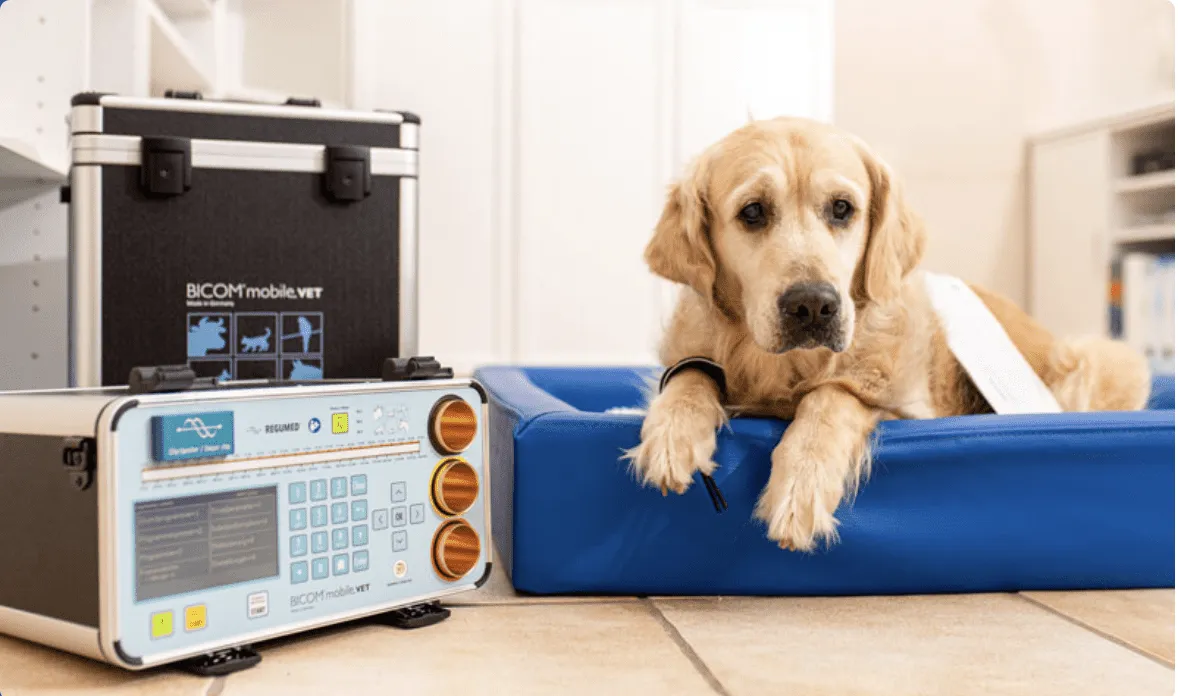
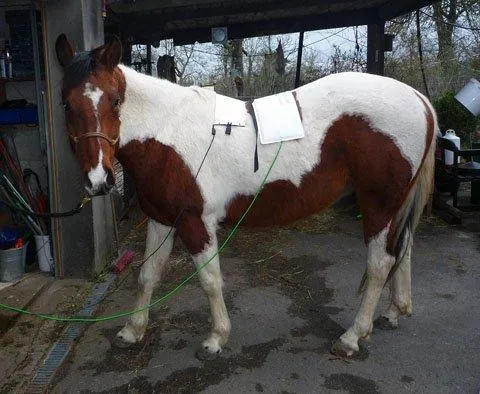
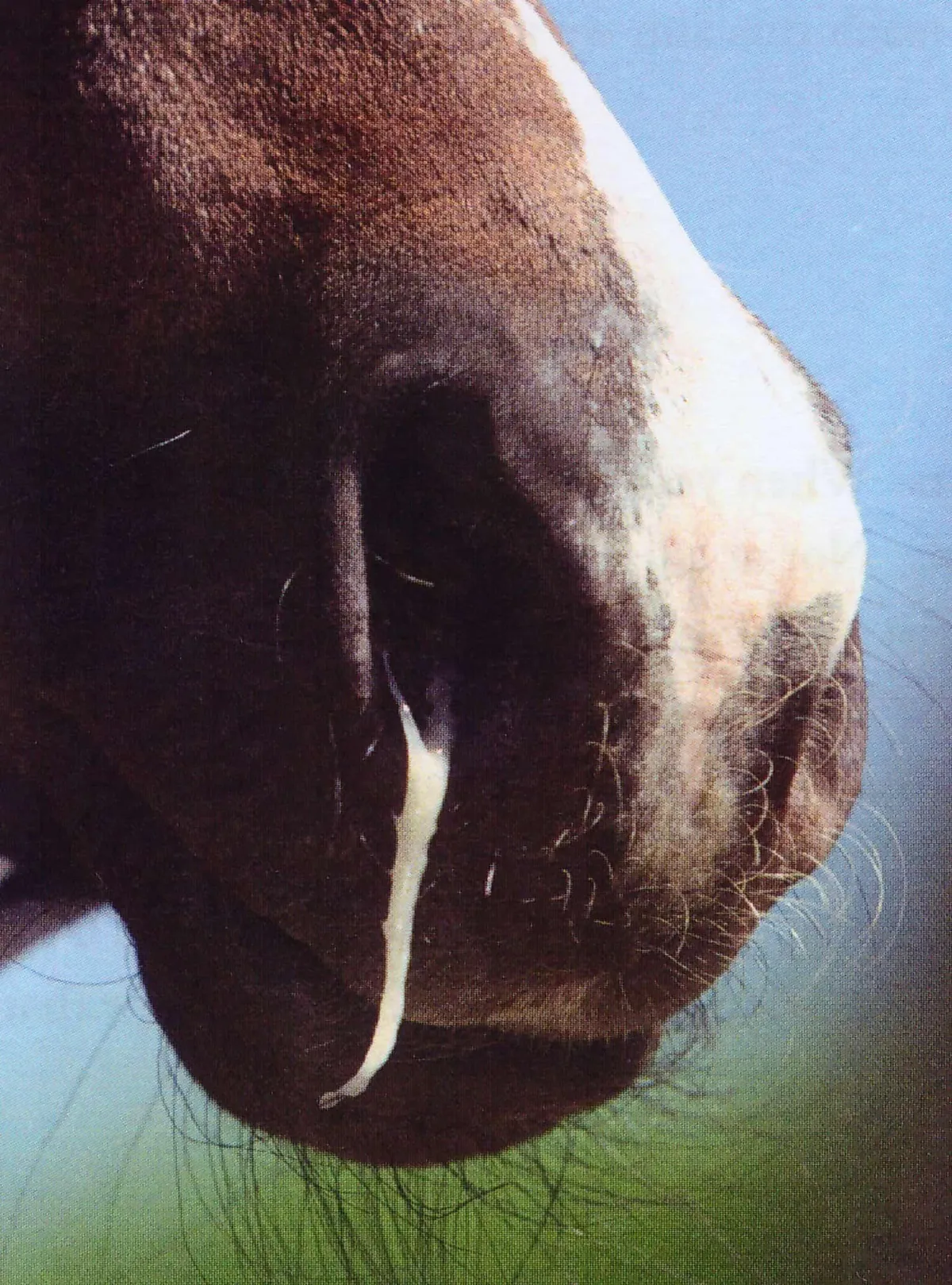
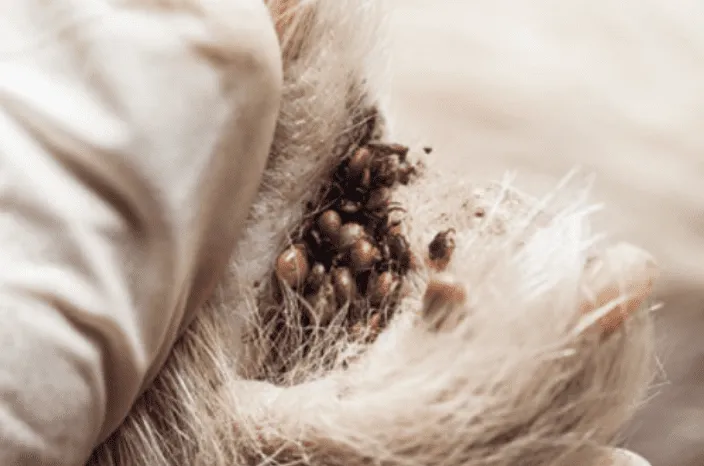
Request more information
Quick Links

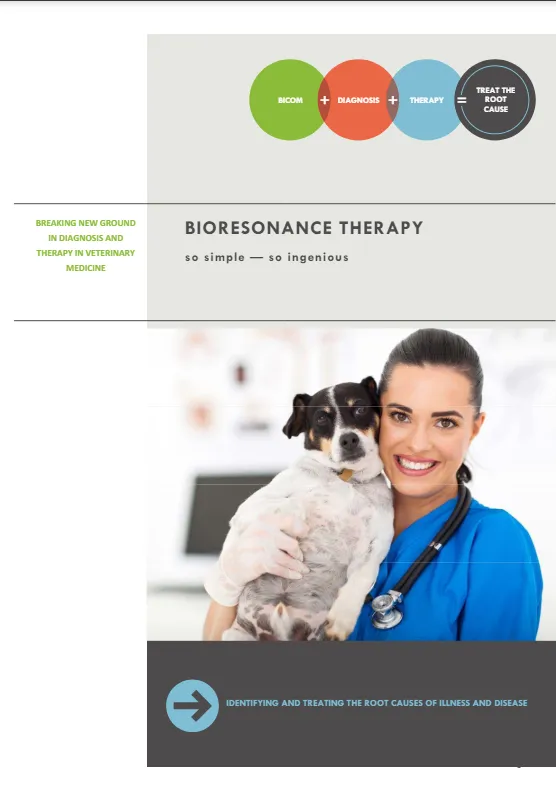
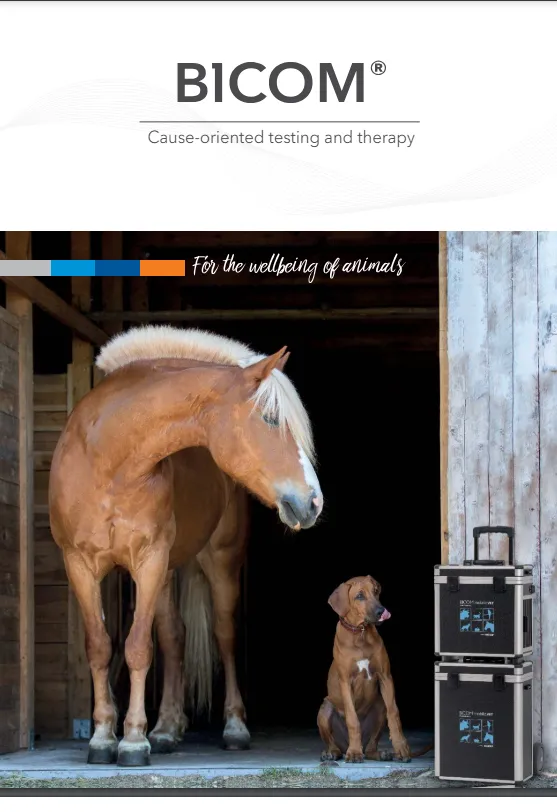


Facebook
Instagram
Mail